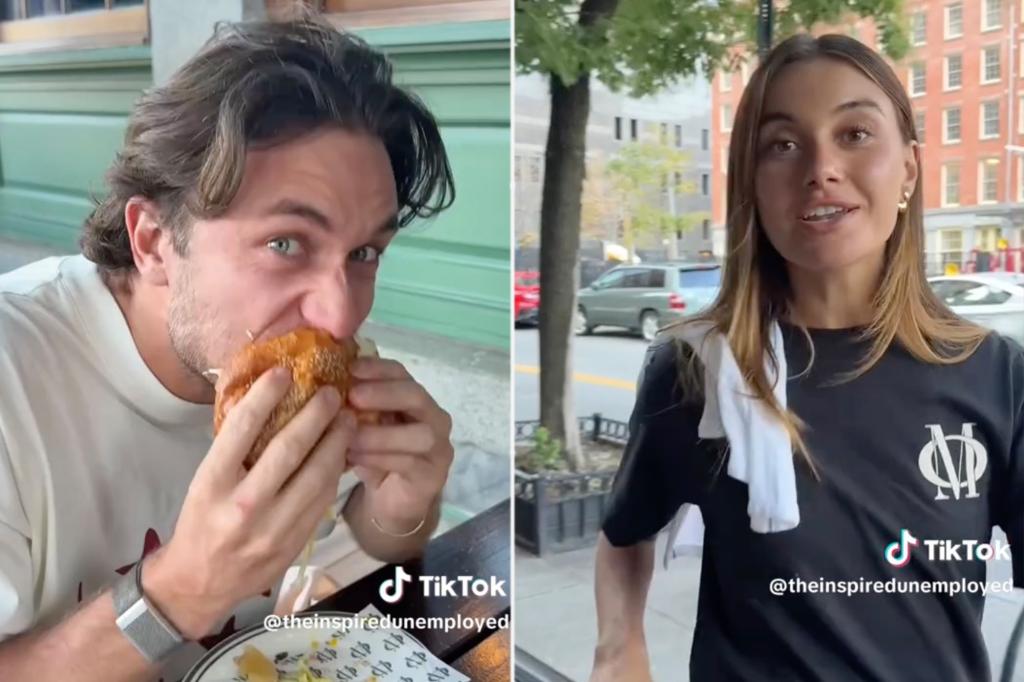The Universal Dining Interruption: When Waiters Always Catch You Mid-Bite
We’ve all been there—that moment when you’re finally settling into your meal, perhaps taking the first substantial bite of a juicy burger, when suddenly a cheerful voice appears at your shoulder. “How’s everything going?” asks the waiter, somehow materializing at precisely the moment your mouth is filled to capacity. You’re left with no choice but to awkwardly nod, frantically chew, or mumble some approximation of “Good, thanks” through a mouthful of food. This seemingly universal dining experience has become so recognizable that comedy duo The Inspired Unemployed recently captured it perfectly in a viral TikTok that resonated with thousands of diners worldwide.
The comedic skit, filmed at an Australian pub called Old Mates in New York City, portrays the escalating absurdity of these mid-bite check-ins. As the meal progresses, the duo becomes increasingly frantic trying to swallow their food faster with each waiter approach, eventually resulting in food spilling everywhere. The comments section exploded with viewers sharing their own similar experiences, confirming the universality of this dining phenomenon. “Literally. Can’t we stop this?” pleaded one commenter, while others chimed in with “This just happened to me and a mate” and “Waiters have that same trait everywhere in the world.” Many Australians specifically noted this as a common occurrence in their dining experiences, with some suggesting it might be even more prevalent in American restaurants, possibly as a strategy to increase tips.
Beyond the inconvenience of speaking with a full mouth, there’s something particularly vulnerable about being caught mid-bite. As one commenter aptly put it, “They see us in our most vulnerable states,” whether that’s with sauce dripping down your beard or during an intimate conversation with your dining companion. Another joked about the irony of being asked if everything is okay while clearly enjoying the meal: “When I take a huge bite out of a burger, and sauce starts dripping down my beard, and the waiter comes over and asks, ‘Is everything good?’… would I eat the way I do if I had a problem with the food?” It’s this blend of humor and mild embarrassment that makes the experience so relatable, transcending cultural and geographical boundaries.
Interestingly, the timing dilemma works both ways in the restaurant dynamic. While many diners complain about too-frequent check-ins during their meal, just as many lament the mysterious disappearance of waitstaff the moment something is actually needed. This contradictory expectation creates an impossible situation for servers, who are trying to balance attentiveness with giving diners space to enjoy their meal. From a professional hospitality perspective, there’s actually sound reasoning behind these seemingly ill-timed check-ins. Industry best practices suggest checking in with customers early in the meal experience, often following what’s known as the “two bites, two sips, or two minutes” rule. This timing allows servers to address any issues before the diner is too far into their meal to make corrections.
Given the universal recognition of this dining quirk, some commenters offered thoughtful alternatives to the traditional verbal check-in. Suggestions included servers giving a subtle thumbs-up from a distance, making eye contact to silently ask if everything is satisfactory, or simply being more observant about whether diners are between bites before approaching the table. These suggestions acknowledge both the importance of service quality checks and the desire for uninterrupted dining experiences. They represent a middle ground that might satisfy both restaurant professionals who need to ensure customer satisfaction and diners who just want to enjoy their meal without the pressure of responding mid-chew.
Not everyone finds these interruptions problematic, however. Some commenters defended waitstaff, suggesting that being briefly interrupted during a meal shouldn’t significantly impact the overall dining experience. “If asking how you are is a buzzkill, then yikes,” remarked one person, while another pointed out, “If a waiter checking in to make sure you’re okay really ruins a conversation for you, you need to be having those conversations elsewhere.” These perspectives highlight an important counterpoint—that perhaps our expectations as diners have become somewhat unreasonable, and that the minor inconvenience of a well-intentioned check-in is a small price to pay for attentive service. After all, restaurant service is fundamentally about human interaction, and with that comes the imperfect timing and occasional awkwardness that characterizes all human exchanges.


